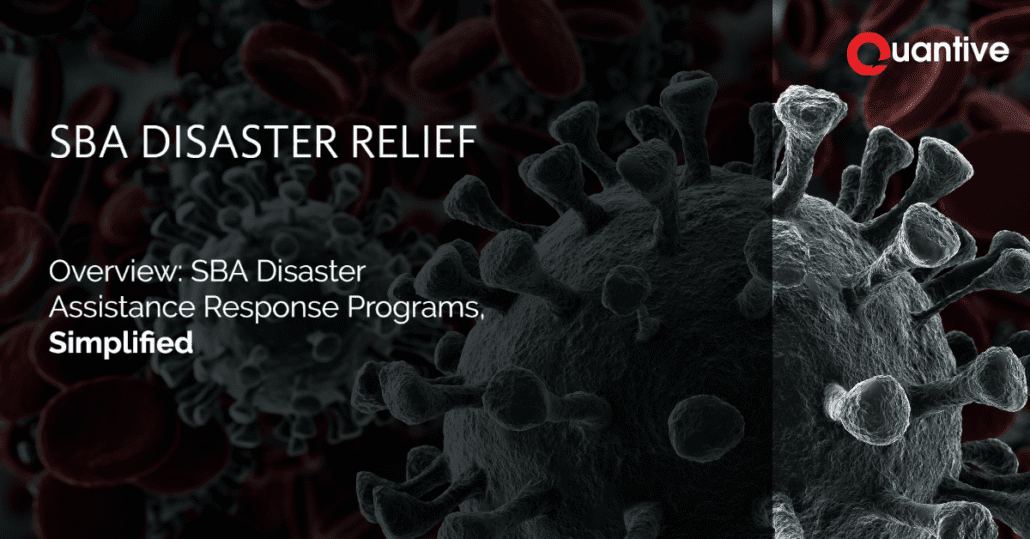SBA Disaster Assistance in Response to COVID-19

Response to COVID-19
The $2 trillion stimulus passed by the Senate included $350 billion small business loan program that will be overseen by the Small Business Administration. This will include offering low-interest federal disaster loans to provide working capital to small businesses experiencing an adverse economic impact from COVID-19. The highlights and details of the program are as follows:
- The Economic Injury Disaster Loan assistance declaration issued by the SBA makes loans available statewide to small businesses to help alleviate economic injury caused by COVID-19.
- SBA’s Economic Injury Disaster Loans will offer up to $2 million in assistance and provide immediate economic support to small businesses to help cover the temporary loss of revenue they are experiencing.
- These loans can be used to pay fixed debts, payroll, accounts payable and other bills that can’t be paid because of the disaster’s impact.
- The interest rate is 3.75% for small businesses.
- SBA offers loans with long-term repayments to keep payments affordable with a maximum term of 30 years. Terms are determined on a case-by-case basis.
The information below details an overview of the SBA Loan Program in general and its requirements.
SBA Loan Program Overview
The SBA has two primary loan programs. The most commonly used is the 7(a) program – which we focus on here – and the 504 program. The 7(a) program is frequently used for working capital expansion or to fund the acquisition of an existing business. In fact, as a business valuation firm, we are most often involved with the SBA 7(a) program in the context of business acquisitions.
One important distinction is that the SBA is not actually a lender. The loan is extended by a bank, and the SBA in turn guarantees a portion of the loan. Thus it’s somewhat of a misnomer when someone suggests “getting a loan from the SBA” – as it is only guaranteed by the SBA.
We very frequently hear directly from borrows that are looking to secure an SBA loan, so we thought it would be apropos to provide a quick overview of the program and its key elements.
Eligibility: What Can a 7(a) Loan be Used For?
SBA Loans are provided to businesses, but it is both the character and nature of both the business and the borrowing principles that dictate eligibility. Key considerations include what the business actually does, as well as the character and creditworthiness of the borrower.
To be eligible businesses must:
- Operate for profit
- Be small, as defined by SBA
- Be a US based business
- Have reasonable invested equity (Yes, this sounds like a future article, right reader? )
- Use alternative financial resources, including personal assets, before seeking financial assistance
- Be able to demonstrate a need for the loan proceeds
- Use the funds for a sound business purpose
- Not be delinquent on any existing debt obligations to the U.S. government
Certain types of businesses are declared ineligible by default by the SBA. While there is actually quite a lengthy list, suffice it to say that if you think the government wouldn’t really want to be involved in a type of business, it’s probably not eligible for the 7(a) loan program. Some examples of ineligible businesses include:
- Banks and Lenders
- Businesses engaged in illegal activities
- Lobbyists
- Businesses principally engaged in teaching, instructing, counseling or indoctrinating religion or religious beliefs, whether in a religious or secular setting
Requirements
7(a) Loan Limits: How Much?
The 7(a) program has a cap of $5 million. That being said, many lenders do not consider loans approaching the upper threshold of size limits. In fact, loans tend average between 300k and 400k.
That being said, some lenders prefer larger loans (and likewise some trend smaller). It makes sense, then, to understand what the appetite a particular bank has for loans by size before starting the application process.
Proceeds: What Can You Use a 7(a) loan for?
- To provide long-term working capital to use to pay operational expenses, accounts payable and/or to purchase inventory
- Short-term working capital needs, including seasonal financing, contract performance, construction financing and exporting
- Revolving funds based on the value of existing inventory and receivables, under special conditions
- To purchase equipment, machinery, furniture, fixtures, supplies or materials
- To purchase real estate, including land and buildings
- To construct a new building or renovate an existing building
- To establish a new business or assist in the acquisition, operation or expansion of an existing business
- To refinance existing business debt, under certain conditions
Typical Terms
| Amount | Term Loans from $25,000 to $5 million. |
| Terms |
|
| Maximum Interest Rates |
|
| Collateral | The bank will take a lien on business assets and/or a mortgage on real estate. |
| Fees | SBA Guarantee Fees:
|
| Underwriting Requirements |
|
| Financing |
|
A Great Program
The 7(a) program is truly a great offering. It provides access to much needed capital that ordinarily wouldn’t be available to smaller companies. This, in turn, spurs growth in the economy. If you need help with a valuation – or access to a lender – give us a ring. We do a vast number of business valuations for 7(a) loans, and have a broad network of lenders that we’d be happy to put you in touch with.
.
.